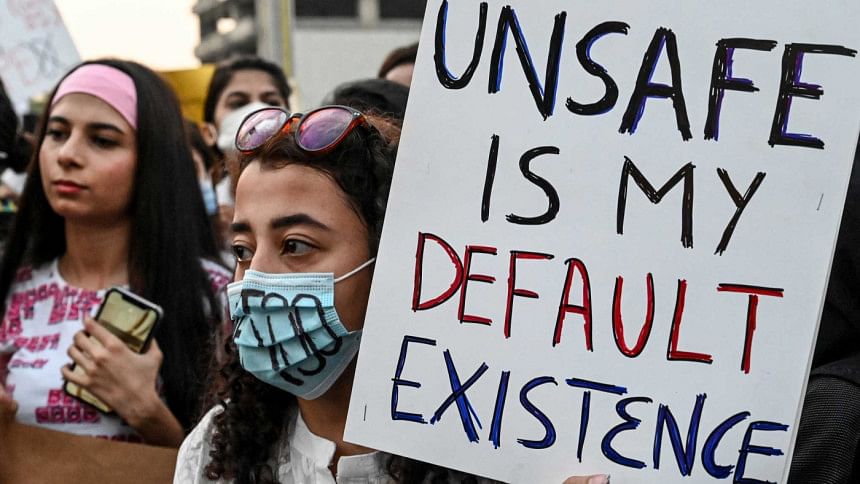Shifting the onus: Unshackle gender from violence

I was invited to write for 16 Days of Activism against Gender-Based Violence, and it felt as if the universe was preparing confetti of convoluted emotions to throw at me. Frankly, I am tired. I can share data, write about dozens of cases of gender-based violence, and even provide some band-aid solutions. But I won't do that here. Instead, I will stick to a few extreme, well-known cases, to save both the readers and me some time, and argue for a full system reset for us all—individually and collectively.
These cases were sensationalised, and the media managed to manoeuvre the discourses and divide people into two major camps: critics and allies of the victims. First, we have Bashundhara Group MD Sayem Sobhan Anvir, against whom a case was filed this year over abetting the death by suicide of a college student at a Gulshan flat in Dhaka, and whose name was later mysteriously dropped as the prime suspect. Second, we have Shafat Ahmed (son of Apan Jewellers co-owner Dildar Ahmed), his friend and director of Regnum Group Shadman Sakif, and two of their associates, who in 2017 allegedly raped two private university students at gunpoint at a birthday party in Banani's Raintree Hotel; they have all just been acquitted. Judge Mosammat Kamrunnahar also recommended that police not accept any rape complaints after 72 hours, sparking a widespread outrage.
The onus, in both cases, was put on women. "Why were they there in the first place?" we asked, as if women with perfect moral compasses are somehow "safe." How, then, could Shahinur, a young man from Joypurhat, have offered to accompany a schoolgirl for her safety, only to rape her and call his friends to join him? Even though the girl and her family managed the courage to file a case, she committed suicide after 11 days of police inaction. How could a college student be threatened with rape by a bus driver and his helper, in broad daylight, just for paying half the fare? No one called out the perpetrators or dissected their characters for throwing a wild "birthday bash," keeping a lover in a secret flat, or for being openly aggressive, let alone question their intent to violate women. The fact that we police and ostracise women for being at parties or for their romantic relations are proof of just how ready we are to normalise violence in everyday life.
A post I found on a satire page asked a simple question to women: "What would they do if they were a man for a day?" My heart broke reading the innocent responses, not to mention the hatred men unleashed in reaction. Their fragile egos could not even handle the simple image of a woman walking on the road in the middle of the night, sipping tea at a tong, running/cycling through the rain, or going on a solo trip. It is frankly bizarre that a society-state can so easily deny half of its population the basic right to exist without the fear of being violated or murdered, and then punish them for demanding that right. As a woman, an academic and an activist in my 40s, I know I am not very different from any of those girls, and I know the price I had to pay for my free will. For working class, indigenous, non-Muslim and trans women, the realities are much worse.
Ask my Anthropology 101 students, and they will tell you why patriarchal societies are always more violent than matrilineal ones; they are characterised by struggles over scarce resources, and capitalist societies are no exception, whereas we essentialise patriarchy and gender stereotypes, as if they are timeless constants. We forget that gender is culturally formed, performative and historically contingent, and thus cannot be treated as social "DNA" that is impossible to change. Our gender awareness, however, comes at the ages of three to five years, and we evolve as gendered beings throughout our lives. We pick up our gender cues from our families, peers, and institutions, and learn how to be gender "normal." We police our girls in the name of protection, scrutinise every fibre of their beings, and make them carry the burden of shame for their very existence, while encouraging our boys to be entitled, ambitious, to go forth and conquer. We criticise, tease, and bully our children, threaten them with violence to make them conform, putting them in their gendered place. We raise our men to be beasts on the prowl, and we send out our daughters as the prey, to battle it out in an unequal field. It is hardly surprising, then, that we always put the onus on the victim.
That is why the parents of the perpetrators in the Raintree rape case could call it just a callous "mistake," or why the suicide victim's sister was made to feel ashamed of the former's relationship with the Bashundhara Group MD. Let's accept that, collectively, we have raised generations of aggressive and potentially violent men. We have failed our children; I have seen so many students—men and women—who believed in dominant gender norms, but also grew exhausted and bruised from fighting against the system. I have seen their insatiable will to learn and change, and the transformations they slowly underwent. How much more could they have become if we had built a nurturing environment?
Eliminating gender-based violence is not rocket science. For decades, UN Women has known that we need states to work on its root causes and bring gender parity in law, and committed governments and strong, independent women's rights movements to hold them accountable. Why, then, are we still where we are? Part of the problem lies within the transnational women's movement itself. Women's movements in Bangladesh, despite their strength, had to succumb to the UN agenda to form transnational alliances. With the neoliberal turn (1980-90s), "women's empowerment" became a marker of progress; women had to shoulder both the nation's progress and be the repositories of tradition/virtue, even when we failed to ensure their dignity and basic human rights. The saviour narrative of Western feminists, the UN, and donor agencies to emancipate women both from poverty and brown men posed a new challenge that had to be navigated carefully.
Yes, girls' education rates and women's visibility in the workplace have increased with women-friendly policies and affirmative action, but we forgot to equip the other half—the boys and men—to deal with these changes. We failed to unburden women from their role as sole caregivers, or change a patriarchal family structure that systematically manipulates and abuses women and children. If we really want to eliminate gender-based violence, we need to re-envision gender as a "domain of agency or freedom" (Butler, 2021), and collectively resist the violence imposed on us by ideal gender norms. We cannot get rid of these indignities by treating gender-based violence as a problem for women only. It is not enough to tell women to march ahead unless we create an enabling space. We need to put the onus on men (and patriarchal women) and make them see, feel ashamed of what they are becoming, how they are a step away from becoming monsters, with the state acting as the breeding ground for such monsters. It is painful, claustrophobic, to have to keep fighting for something that is supposed to be rightfully mine. Freedom is inevitable, but how much will we make it cost on the way?
Dr Seuty Sabur teaches anthropology at the Department of Economics and Social Sciences in Brac University.

 For all latest news, follow The Daily Star's Google News channel.
For all latest news, follow The Daily Star's Google News channel. 



Comments